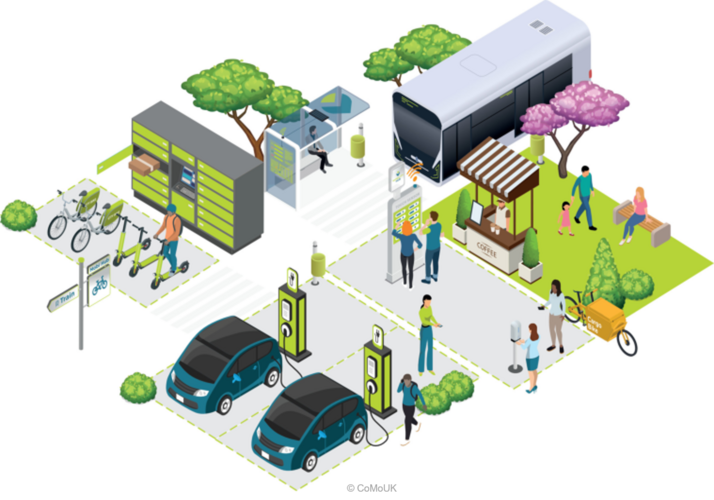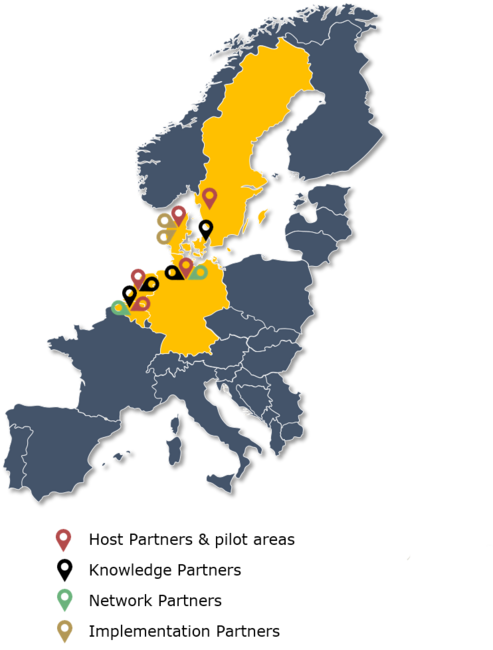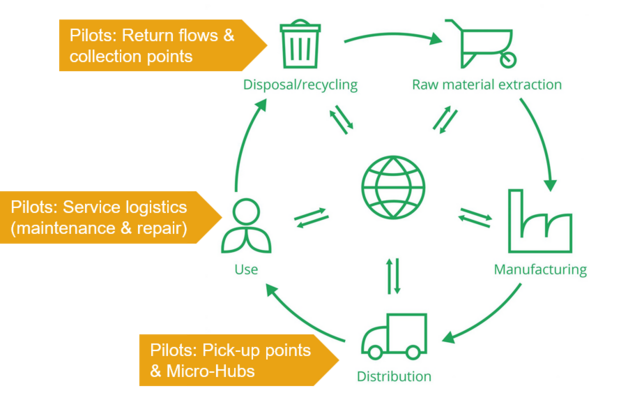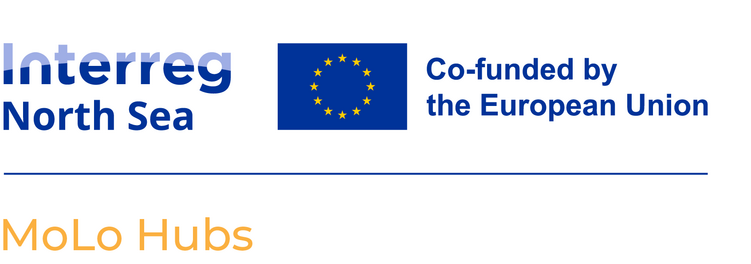MoLo Hubs - People-Centric Mobility & Logistics Hubs
MoLo Hubs aims to reduce urban traffic by initiating and prototypically implementing new and convenient logistics service offers at urban mobility hubs. Five pilots will make an important contribution to reduce urban traffic, increase the attractiveness and functionality of urban mobility hubs and also give an insight into how user-centred logistics services can be designed.
All pilot regions (Aalborg, Amsterdam,Borås, Hamburg and Mechelen) envisage in the project the implementation and use of digital platform solutions and/or automated sensor or transport solutions to offer the services.

Short info
Project period: July 2023 – December 2026
Funding Programme: The project is co-financed by the European Union from the EU Interreg North Sea Region 2021 - 2027 (European Regional Development Fund)
Project budget: Total EUR 3.678.537 million, funding (ERDF): EUR 2.207.122 million
Project focus:
- Developing and implementing user-centric logistics services and solutions at urban mobility hubs to reduce urban traffic
- Increase attractiveness of mobility hubs
- Make use of up-to-date digital technologies, to implement smart and digital solutions and
to foster digital skills - Carried out in 5 pilot regions (Aalborg, Amsterdam, Borås, Hamburg and Mechelen)
Project partners
The project consortium consists of 13 partners from 5 different countries (Belgium, Denmark, Germany, Netherlands and Sweden) and brings together scientific expertise, public authorities and economic actors.
- Logistik-Initiative Hamburg, DE
- Stadtreinigung Hamburg Anstalt des öffentlichen Rechts, DE
- Hamburg Institute for Innovation, Climate Protection and Circular Economy, DE
- Universiteit Antwerpen, NL
- City of Borås, SE
- City of Amsterdam, NL
- Amsterdam University of Applied Sciences, NL
- Promotion of Operational Links with Integrated Services aisbl (POLIS Network), BE
- City of Mechelen, BE
- Transition ApS, DK
- Aalborg Municipality, DK
- House of Venture North Jutland, DK
- CoolRunner, DK
Logistics Initiative Hamburg will act as a network partner and lead partner of MoLo Hubs and will mainly coordinate the project in terms of project management, project reporting as well as the project level communication.
Furthermore, they will be involved in all work packages, related to the crosscutting focus topic of operator views, logistics processes and supply chain as well as active stakeholder involvement.

Project contents & goals

Today, 70% of the EU population is living in cities and urban areas. In 2050, 83% of this population will live in cities. This will lead to further demand for mobility services, well-organized city logistics processes and urban commercial transports. At the same time, end consumers demand for convenient urban services will grow. In order to reach the European Green Deal target of reducing greenhouse gas emissions by 90 % by 2050, city logistics processes and services need to be re-thought.
With increased urbanization, the North Sea Region encounters many issues related to transportation, such as increased noise and air pollution, traffic congestion, high parking pressure and accident costs. Shared mobility can foster mobility transition and has the potential of becoming one of the pillars of a sustainable urban mobility system. It increases the use and efficiency of transportation assets, supports the shift towards sustainable modes of transport and reduces car-dependency.
However, in order to activate the potential of shared mobility hubs, their convenience and functions need to be expanded. At the same time, induced transports for last mile logistics operations need to be reduced. Combining innovative logistics services (supply & return flows) with shared mobility hubs creates strong synergies. Increasing attractiveness of mobility hubs for their users and decreasing commercial urban transports at the same time enables car-free districts in city development.
MoLo Hubs strongly focusses on the initiation and implementation of new logistics services integrated into mobility hubs, in order to reduce commercial traffic in urban areas induced by logistics operations and at the same time increase the functionalities and convenience of mobility hubs for users and through this increase their use and attractiveness. Therefore, MoLo Hubs not only creates a shift of traffic to green and active modes of transport, but also new and innovative urban value chains. These are being implemented in 5 regions and are tackling all aspects of a typical product life cycle (distribute - repair -dispose) by conducting pilots for all stages of such product life cycles. By combining logistics services with mobility hubs, users are given an incentive to use and frequent mobility hubs more often. This will lead to a decrease in traffic congestion, reduced GHG emissions and optimised accessibility and use of public space, all representing current territorial challenges for urban mobility in cities and regions along the North Sea Region.
In addition, digital solutions will be used in individual pilots, allowing users smart and easy access to new logistics services. The project's USP will be the strong focus on people-centricity. Involvement of the user needs from the very beginning, the incorporation of smart spatial planning and city design aspects and social aspects will support acceptance and prospects of success for the piloted solutions throughout the project lifetime and beyond.
MoLo Hubs defines itself as a "learning journey" along the implementation of the pilots. Some of the logistics services to be implemented are comparable, but involve different starting situations or local challenges, whose solutions can be benefits for all pilot regions or adapted in other ways.
Project results
The project is not yet completed. Project work status and results will be published regularly on the official project website.


